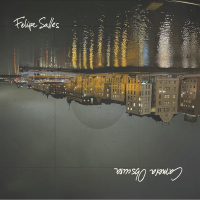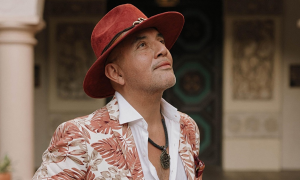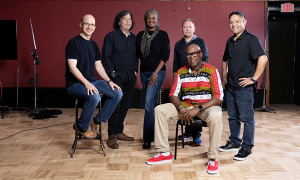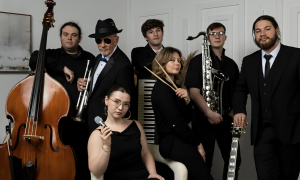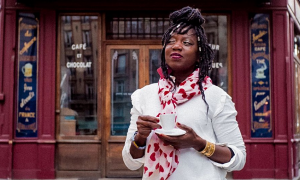Home » Jazz Articles » Take Five With... » Take Five With Braxton Cook
Take Five With Braxton Cook

As a young emerging saxophonist, Braxton Cook has already garnered several honors and accolades. While in high school, he had been honored to be one of 30 other high school musicians selected from a nationwide competition to participate in the 2009 Grammy Jazz ensemble, held during the same week as the Grammy Awards. During his freshman year at Georgetown University, Braxton was selected as NFAA's 2010 YoungARTS Finalist and participated in a fully-paid expense week in Miami, Florida with 150 other Finalists. During his time in Miami, he received the Silver Medal and was selected to participate in another YoungARTS week in New York with other Silver and Gold Medalists.
In the fall of 2011, Braxton transferred from Georgetown University, where he studied English, to the prestigious Juilliard School on the Illinois Jacquet Scholarship to hone his skills as a jazz saxophonist. Since his transition, he was fortunate to share the stage with

Wynton Marsalis
trumpetb.1961

Jon Batiste
pianob.1986

Christian Scott aTunde Adjuah
trumpetb.1983

Thelonious Monk
piano1917 - 1982
In his remaining years at The Juilliard School, Braxton will continue to study music privately with his private teachers

Ron Blake
saxophoneb.1965

Steve Wilson
saxophoneb.1961
Instrument(s):
Alto saxophone.
Teachers and/or influences?
My first saxophone teacher was Paul Carr and he taught me really everything I needed to know as it pertains to improvisation. When I transferred to Juilliard I began to study with Ron Blake and Steve Wilson and the lessons I have learned from them are invaluable.
I knew I wanted to be a musician when...
I first heard

Grover Washington, Jr.
saxophone1943 - 1999
Your sound and approach to music:
My sound is very much rooted in the tradition as well as the soulful approach of Grover Washington Jr. and

Cannonball Adderley
saxophone1928 - 1975
Your teaching approach:
My philosophy in teaching is to make sure the students are having fun. Music has always been fun to me and there has always been this curiosity in me that I don't think should ever be squashed in students. I want to cultivate this curiosity in students and guide it.
Your dream band:
I don't have a particular idea band but there are some artists I would love to work with :

Roy Haynes
drums1926 - 2024

Roy Hargrove
trumpet1969 - 2018

Jeff Tain Watts
drumsb.1960

Herbie Hancock
pianob.1940
Road story: Your best or worst experience:
The craziest thing that ever happened to me on the road was one night in Paris. I had a few drinks with a friend and was almost being killed in an alley by some French mobsters that didn't speak any English and clearly hated Americans. Fortunately, they let us go and we got away!
Favorite venue:
My favorite venue in the world is probably Fashing in Stockholm, Sweden.
Your favorite recording in your discography and why?
My debut release Sketch. It's a compilation of all of my original music that accurately reflects all of my influences.
The first Jazz album I bought was:
Cannonball Adderley's Mercy, Mercy, Mercy (Capitol, 1966).
What do you think is the most important thing you are contributing musically?
One of the most important aspects of artistry is the ability to tell a story. In my music I am trying to show people who I am and I am not afraid to be transparent and vulnerable through my music.
Did you know...
My middle name is Earl.
CDs you are listening to now:

John Coltrane
saxophone1926 - 1967

Brad Mehldau
pianob.1970
Christian Scott, Atunde Adjuah (Concord, 2012);
Charlie Parker, Bird at St. Nicks (Ojc, 1991);
Andre Benjamin, The Love Below (La Face, 2003).
Desert Island picks:
Grover Washington Jr. Winelight (Elektra, 1980);
Miles Davis, Kind of Blue (Columbia, 1959);
John Coltrane, A Love Supreme (Impulse, 1965);
Charlie Parker, Live at Massey Hall (Ojc, 1953);
Andre Benjamin, The Love Below (La Face, 2003).
How would you describe the state of jazz today?
Jazz today seems to be in an interesting place. While there is still a very strong traditional faction, there is also a faction that is very forward thinking and incorporates elements of rock, hip hop, and R&B. Artists such as

Esperanza Spalding
bassb.1984

Robert Glasper
pianob.1978
What are some of the essential requirements to keep jazz alive and growing?
Musicians have to first remember that we are in the entertainment industry and in 2014 the way we look and act is just as important or more important than how we play. We also have to remember that are storytellers and the way to remain relevant is to write about the things that we see around us.
What is in the near future?
In the near future I will continue school at Juilliard while trying to tour with Christian Scott's band as well as play shows with my quartet. I am also lining up another record project with my drummer,

Corey Fonville
drumsWhat is your favorite song to whistle or sing in the shower?
"Pure Imagination."
By Day:
Student at the Juilliard School.
If I weren't a jazz musician, I would be a:
An orthodontist.
Tags
Braxton Cook
Take Five With...
United States
wynton marsalis
Jonathan Batiste
CHRISTIAN SCOTT
Thelonious Monk
Ron Blake
Steve Wilson
Grover Washington, Jr.
Julian "Cannonball" Adderley
Roy Haynes
Roy Hargrove
Jeff "Tain" Watts
Herbie Hancock
Paris
Stockholm
John Coltrane
brad mehldau
Esperanza Spalding
Robert Glasper
Corey Fonville
Comments
PREVIOUS / NEXT
Braxton Cook Concerts
Oct
2
Thu

Braxton Cook
BOP STOPCleveland, OH
Oct
30
Thu

BRAXTON COOK (EARLY SHOW)
Jack London RevuePortland, OR
Oct
30
Thu

BRAXTON COOK (LATE SHOW)
Jack London RevuePortland, OR
Nov
11
Tue

Braxton Cook
Blue Note New YorkNew York, NY
Nov
11
Tue

Braxton Cook
Blue Note New YorkNew York, NY
Nov
12
Wed

Braxton Cook
Blue Note New YorkNew York, NY
Nov
12
Wed

Braxton Cook
Blue Note New YorkNew York, NY
Nov
21
Fri

Braxton Cook
Jazz CafeLondon, UK
Support All About Jazz
 All About Jazz has been a pillar of jazz since 1995, championing it as an art form and, more importantly, supporting the musicians who make it. Our enduring commitment has made "AAJ" one of the most culturally important websites of its kind, read by hundreds of thousands of fans, musicians and industry figures every month.
All About Jazz has been a pillar of jazz since 1995, championing it as an art form and, more importantly, supporting the musicians who make it. Our enduring commitment has made "AAJ" one of the most culturally important websites of its kind, read by hundreds of thousands of fans, musicians and industry figures every month.


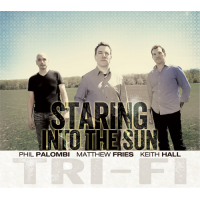




 Buy Now
Buy Now



